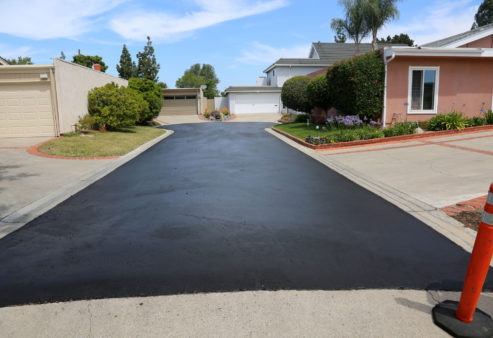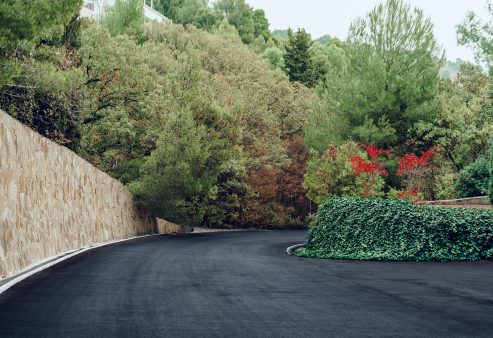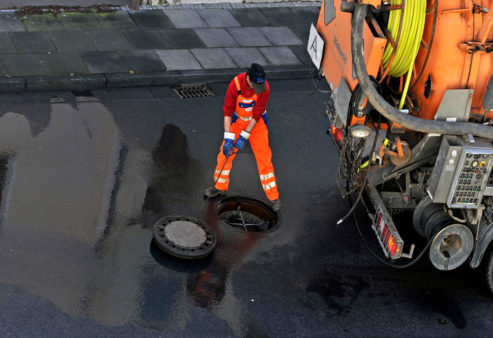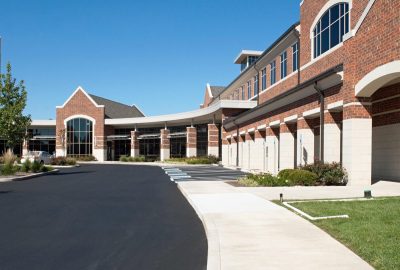Choosing the perfect material for your driveway is key to saving money and ensuring satisfaction with the final result. Both asphalt and concrete are popular options, each with its own set of advantages and disadvantages.
We will explore their cost-effectiveness, longevity, and overall worth to help you determine which material is the best fit for your driveway needs. At TurnKey Asphalt, we specialize in providing expert advice and top-notch services to help you make the best decision for your project.
Contact us today to learn more about how we can assist you in achieving a durable and cost-effective driveway solution.
Understanding and Comparing Asphalt and Concrete
 Choosing between asphalt and concrete depends on your project’s needs. Asphalt is flexible, handles heavy traffic well, and is cheaper to install, making it great for busy areas. However, it needs more upkeep over time. Concrete lasts longer with less maintenance but can crack if the ground shifts. It’s also more expensive upfront but offers different finishes for a nicer look. Consider your budget, how much use the area will get, and your local climate before deciding. Asphalt warms up faster in winter, which is handy for snowy places.
Choosing between asphalt and concrete depends on your project’s needs. Asphalt is flexible, handles heavy traffic well, and is cheaper to install, making it great for busy areas. However, it needs more upkeep over time. Concrete lasts longer with less maintenance but can crack if the ground shifts. It’s also more expensive upfront but offers different finishes for a nicer look. Consider your budget, how much use the area will get, and your local climate before deciding. Asphalt warms up faster in winter, which is handy for snowy places.
Addressing asphalt driveway issues often involves consulting concrete driveway professionals, especially when considering the switch from using asphalt to a more durable concrete pavement material. Think about what you value more: saving money now or less maintenance later, plus the look you want to achieve.
Cost Analysis
Choosing an asphalt driveway can save you money initially, costing between $2 and $5 per square foot. It’s a great option for those on a budget. However, concrete driveways, while more costly at the start, ranging from $4 to $10 per square foot, bring better visual appeal and have a longer lifespan. They can last up to 30 years, which is about 10 years longer than asphalt.
Even with the higher upfront investment, the long-term benefits and lower maintenance needs of concrete driveways make them a more financially savvy choice over time. Remember, both need extra cash for upkeep over time.
Durability, Maintenance, and Repairs
The durability and overall condition of your driveway significantly depend on the choice of material and the level of maintenance it receives. If you regularly maintain an asphalt driveway, it can last between 15 and 20 years.
On the other hand, a concrete driveway could exceed 30 years of service life if you promptly address any stains or cracks that appear. For gravel driveways, smooth them often, and for sand or paver ones, replace them as needed to make them last longer. Doing these small repairs saves you money and hassle in the long run.
Lifespan Factors
 Concrete driveways last over 30 years, but asphalt driveways only last 15 to 20 years. The longevity of both materials is influenced by the climate and their usage levels. Asphalt is better for cold places but needs more upkeep since it can crack and get damaged by oil. Concrete handles heat and weight better but can crack in freezing conditions. So, picking between asphalt and concrete really comes down to the climate of the area.
Concrete driveways last over 30 years, but asphalt driveways only last 15 to 20 years. The longevity of both materials is influenced by the climate and their usage levels. Asphalt is better for cold places but needs more upkeep since it can crack and get damaged by oil. Concrete handles heat and weight better but can crack in freezing conditions. So, picking between asphalt and concrete really comes down to the climate of the area.
Maintenance Tasks
Regular maintenance is key to making driveways last longer. Seal asphalt every 2-3 years to stop water damage and cracks. Clean concrete driveways and seal them to protect from stains and weather damage. Asphalt repairs are easier and cheaper, often DIY with store-bought patching materials. Concrete repairs are rarer but pricier and need special tools and materials.
Repair Costs
When considering driveway costs, remember that asphalt is cheaper at first but might cost more for upkeep later. Concrete costs more initially but lasts longer and needs less maintenance, saving money over time for many homeowners.
Environmental and Aesthetic Considerations
Having a basic asphalt driveway and a concrete driveway are key in building cities but affect the environment differently. Concrete lasts longer, needing fewer replacements and saving materials, but it produces more CO2. Asphalt is better for the planet because it’s mostly recyclable, reducing waste and using fewer resources from the start.
Looks-wise, concrete offers more choices in colors and finishes, able to look like other driveway materials or be brightly colored. Asphalt usually comes in black or dark gray but has a neat, uniform appearance. New ways to color and finish asphalt are making it more visually appealing too.
Making the Right Choice for Your Project
Selecting the best driveway material matters for its durability, look, and use. Consider options like concrete, asphalt, gravel, and pavers, each with pros and cons. Factor in your local weather, driveway usage, upkeep needs, and budget. Asphalt is budget-friendly and suits colder places, whereas pavers cost more but enhance appearance. Get advice from experts to make the right choice.
Climate Impact
Cold climates challenge driveways. Asphalt, with its flexible nature, thrives here. It resists cracks from freeze-thaw cycles. Concrete suffers in comparison, often cracking.
Warm areas favor concrete. Its reflective surface keeps it cooler. Asphalt can become soft and tacky under intense heat, leading to deformities.
Budget Considerations
Asphalt typically offers a lower upfront cost. It’s quicker to install, reducing labor costs. Concrete, though more expensive initially, boasts longevity and less frequent maintenance.
Load Requirements
 Heavy vehicles demand a strong base. Concrete’s rigidity supports heavier loads without distress. Asphalt might need more frequent repairs under such conditions.
Heavy vehicles demand a strong base. Concrete’s rigidity supports heavier loads without distress. Asphalt might need more frequent repairs under such conditions.
Personal Preferences
Your choice reflects your style. Concrete provides a range of finishes, enhancing your home’s curb appeal. Asphalt offers a classic look that blends well with most landscapes.
Decision Guidance
Each option serves different needs. Assess your climate, budget, and aesthetic preferences carefully. Professionals can offer tailored advice, ensuring your driveway complements your home perfectly.
Work with TurnKey Asphalt for Your Asphalt Driveway Needs!
Deciding between asphalt and concrete? Consider their price, longevity, maintenance, and environmental impact. Asphalt costs less initially, but concrete’s longer lifespan could save you money over time. Both materials have unique aesthetics and environmental effects to consider. Your decision will impact your budget, the planet, and your property’s appearance for years.
Now it’s your turn. With this information, you can choose what’s best for your budget, eco-friendly goals, and style. If you need more help, don’t hesitate to contact experts who can provide advice specific to your needs. Ready for your ideal driveway? Move forward with confidence today.
At TurnKey Asphalt, we’re here to help you make the best choice for your driveway. Contact us now to get started on creating the perfect driveway solution for your home.







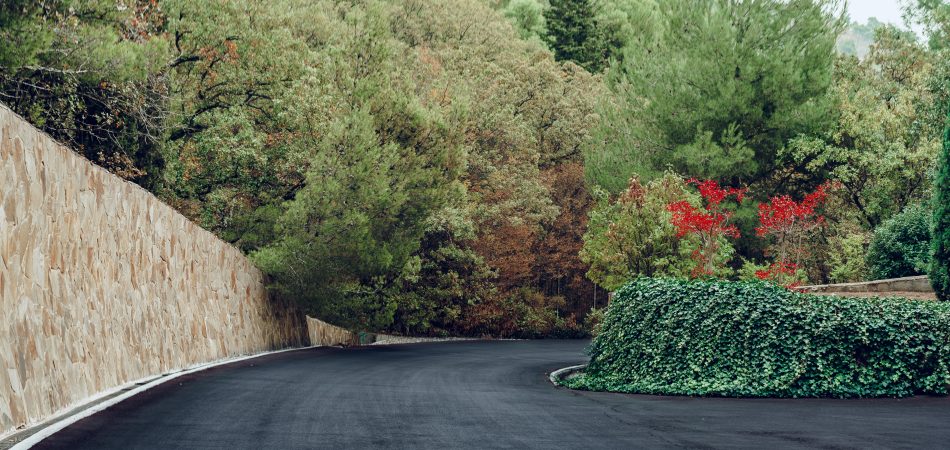
 By TurnKey Asphalt
By TurnKey Asphalt  Jul 11, 2024
Jul 11, 2024  Choosing between asphalt and concrete depends on your project’s needs. Asphalt is flexible, handles heavy traffic well, and is cheaper to install, making it great for busy areas. However, it needs more upkeep over time. Concrete lasts longer with less maintenance but can crack if the ground shifts. It’s also more expensive upfront but offers different finishes for a nicer look. Consider your budget, how much use the area will get, and your local climate before deciding. Asphalt warms up faster in winter, which is handy for snowy places.
Choosing between asphalt and concrete depends on your project’s needs. Asphalt is flexible, handles heavy traffic well, and is cheaper to install, making it great for busy areas. However, it needs more upkeep over time. Concrete lasts longer with less maintenance but can crack if the ground shifts. It’s also more expensive upfront but offers different finishes for a nicer look. Consider your budget, how much use the area will get, and your local climate before deciding. Asphalt warms up faster in winter, which is handy for snowy places. Concrete driveways last over 30 years, but asphalt driveways only last 15 to 20 years. The longevity of both materials is influenced by the climate and their usage levels. Asphalt is better for cold places but needs more upkeep since it can crack and get damaged by oil. Concrete handles heat and weight better but can crack in freezing conditions. So, picking between asphalt and concrete really comes down to the climate of the area.
Concrete driveways last over 30 years, but asphalt driveways only last 15 to 20 years. The longevity of both materials is influenced by the climate and their usage levels. Asphalt is better for cold places but needs more upkeep since it can crack and get damaged by oil. Concrete handles heat and weight better but can crack in freezing conditions. So, picking between asphalt and concrete really comes down to the climate of the area. Heavy vehicles demand a strong base. Concrete’s rigidity supports heavier loads without distress. Asphalt might need more frequent repairs under such conditions.
Heavy vehicles demand a strong base. Concrete’s rigidity supports heavier loads without distress. Asphalt might need more frequent repairs under such conditions.